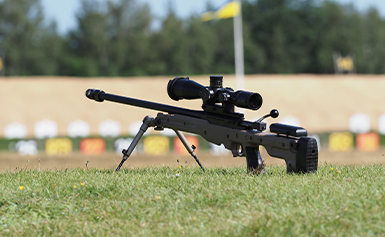- Statement of policy
National Shooting Centre Limited is fully committed to the principle that no employee or job applicant shall receive unfavourable treatment on the grounds of age, disability, gender reassignment, marital status or civil partnership, race, religious beliefs, sex, sexual orientation or for any other reason that can be objectively justified.
- Reasons for the policy
National Shooting Centre Limited wishes to employ the most suitable and appropriately qualified people for the work to be undertaken. Consequently, sound business reasons support the promotion by the company of equal opportunities in employment. Over a period of time, legislation has been introduced to encourage equal opportunities and to render discrimination unlawful. The Equality and Human Rights Commission has been established to work towards the elimination of discriminatory practices and has devised codes of practice which contain practical advice on ways to avoid discrimination and on the management of an equal opportunities policy.
- Equality of treatment
The policy aims to ensure that members of staff adhere to the principle of equality of treatment. It prohibits acts of discrimination whereby one individual is treated less favourably than another on the grounds of any one of the above range of protected characteristics.
Examples of such discrimination by an employer include:
- Deliberately refusing or omitting to make an offer of employment
- Restricting or denying access to promotion, transfer, training, or other benefits or facilities
- Dismissing an individual
- Subjecting an individual to some other detriment (for example, racial or sexual harassment)
- Discriminating in the arrangements made for deciding who should be offered a job.
The Equality Act 2010 identifies a number of different types of discrimination. These are:
Direct discrimination – where someone is treated less favourably than another person because of a protected characteristic.
Indirect discrimination – this can occur when you have a rule or policy that applies to everyone but disadvantages a person with a particular protected characteristic.
Harassment – this is behaviour that is deemed offensive by the recipient. Employees can now complain of the behaviour they find offensive even if it is not directed at them.
Victimisation – this occurs when someone is treated badly because they have made or supported a complaint or grievance under this legislation.
A manager or employee who contravenes (or knowingly aids another person to contravene) the company’s policy may be held personally liable for committing an act of lawful discrimination and may, together with the company, be subject to legal proceedings.
- Responsibilities
The management official with overall responsibility for the application of the equal opportunities policy is:
Andrew Mercer
Each manager is responsible for communicating the policy to all employees, providing operational procedures and training, and monitoring the application of the policy. Managers and supervisors are responsible for ensuring that they and all staff under their control understand the policy and observe the correct procedures.
All employees have an important part to play in the application of the policy, that their attitudes and actions are consistent at all times with both the spirit and the letter of the policy.
- Recruitment, selection and promotion
National Shooting Centre Limited’ intention in respect of recruitment, selection and promotion is to appoint the most able candidate for each job.
In order to ensure that this intention is realised, the requirements of each job are identified and all candidates assessed against the same criteria at each stage of the selection process, to ensure that fairness and consistency are achieved throughout. Similarly, all candidates for promotion possessing appropriate skills, knowledge and experience are given the same degree of consideration. Employee appraisals are concerned only with the assessment of actual performance in the job.
- Training
Educational and vocational courses leading to relevant qualifications are available to all employees equally.
Training in matters relating, directly or indirectly, to equal opportunities is regarded as a vital component in the training programmes for managers and supervisors, both as a means to maintaining the level of awareness of the policy and of ensuring that the policy is operating as the company intends.
- Conditions of employment and provision of benefits and services
All conditions of employment, employee benefits and services apply to all employees equally.
Accommodation and facilities are provided, as far as it is practicable to do so, having proper regard for the needs of the disabled.
- Observing the policy
The overall aim of the policy is to promote a harmonious working environment for all members of staff. Therefore, the appropriate supervisor or manager should be informed if an occasion arises, or is suspected to have arisen, where an individual experiences unfavourable treatment on the grounds any of the protected characteristics. Any employee who feels he or she is unable to discuss the matter with his or her supervisor or manager may contact:
Anderw Mercer
A member of staff with a grievance concerning the application of this policy should follow the grievance procedure. It is a disciplinary offence to discriminate intentionally against a fellow employee or job applicant in contravention of the policy.
- Monitoring
The company will monitor and continuously review the operation of the policy and expects all employees to co-operate by providing relevant information, where necessary. All such information will be treated as strictly confidential and used solely for this purpose.
- Harassment
Harassment on the basis of a protected characteristic is a form of discrimination. It is unlawful behaviour and in direct contravention of the company’s equal opportunity policy.
Harassment is unwanted conduct on the grounds of a protected characteristics, which is either personally offensive or failure to respect the rights of others. It includes making gestures, comments or ‘jokes’, the display of offensive material and physical contact or assault.
Managers and supervisors have a responsibility to eliminate any harassment or intimidation of which they are aware.
An employee who believes that he or she is, or has been the subject of harassment should initially raise the matter with his or her immediate supervisor.
Either
If an employee believes they have been harassed they should raise a complaint under the company’s harassment procedure
Or
Formal investigations of complaints will be dealt with in accordance with the company’s grievance and disciplinary procedures, and will be handled sensitively and confidentially, with due respect for the rights of those concerned. If the outcome of the investigation reveals that a complaint is justified, appropriate action, including disciplinary action, will be taken. Retaliation or victimisation of an employee who has complained about harassment will also be treated as a disciplinary offence.
- Policy Review Record
| Revision | Date | Review Summary | Review By |
| 1 | 4th January 2021 | Annual Review | Andrew Mercer |
| 2 | 4th January 2022 | Annual Review | Andrew Mercer |
- Document Issue and Control
A copy of this document is to be issued to all staff after annual review with the master copy held at the head office.
The policy is to be discussed and issued during all new employee inductions
If you have any questions about this policy, please contact us via email at info@nationalshootingcentre.co.uk







